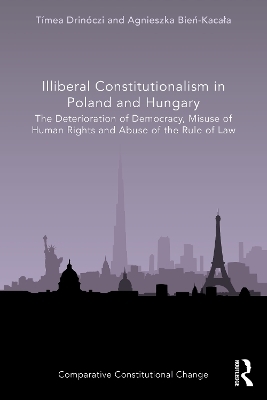
Illiberal Constitutionalism in Poland and Hungary
Routledge (Verlag)
978-1-032-00736-6 (ISBN)
The work consists of seven Parts. Part I outlines the volume’s ambitions and provides an introduction. Part II discusses the theoretical framework and clarifies the terminology adopted in the book. Part III provides an in-depth insight into the constitutional identity of Poles and Hungarians and argues that an unbalanced constitutional identity has been moulded throughout Polish and Hungarian history in which emotional traits of collective victimhood and collective narcissism, and a longing for a charismatic leader have been evident. Part IV focuses on the emergence of illiberal constitutionalism, and, based on both quantitative and qualitative analyses, argues that illiberal constitutionalism is neither modern authoritarianism nor authoritarian constitutionalism. This Part contextualizes the issue by putting the deterioration of the Rule of Law into a European perspective. Part V explores the legal nature of illiberal legality when it is at odds and in compliance with the European Rule of Law, illiberal democracy, focusing on electoral democracy and legislative processes, and illiberalization of human rights. Part VI investigates whether there is a clear pattern in the methods of remodeling, or distancing from constitutional democracy, how it started, consolidated, and how its results are maintained. The final Part presents the author’s conclusions and looks to the future.
The book will be an invaluable resource for scholars, academics and policy-makers interested in Constitutional Law and Politics.
Tímea Drinóczi is Visiting Professor at the Faculty of Law at Federal University of Minas Gerais, Brazil. Since 2017, she has also been a Doctor of the Academy of Sciences of Hungary. Professor Drinóczi has been a visiting professor in law schools in Plzen, Brno, Cologne, Graz, Istanbul, and Osijek, and has presented papers at several conferences all over Europe, in Hong Kong, Nanjing, Seoul, and Santiago. She served as a professor at the University of Pécs, Faculty of Law, Hungary, and Kenyatta University School of Law, Nairobi, Kenya. Agnieszka Bień-Kacała is Professor within the Department of Constitutional Law, Faculty of Law and Administration at Nicolaus Copernicus University in Toruń, Poland. Professor Bień-Kacała has been a visiting professor in law schools in Athens, Prague, and Maastricht. Together, Professors Drinóczi and Bień-Kacała have presented papers at several conferences all over Europe, and in Hong Kong and Santiago de Chile.
Part I. Introduction - Ambitions and Comparison
I. Ambitions
II. Why Hungary and Poland
III. Insight into the book
Part II. Terms - Constitutionalism, illiberal(ism), and constitutional democracy
I. Constitutionalism in the term "illiberal constitutionalism"
II. Illiberal(ism)
III. Constitutional democracy
Part III. Identity - Unbalanced constitutional identity: emotions and values
I. Historical and emotional trajectory
II. Post-communist past and beyond
III. Possible root cause: the combination of the above
Part IV. Limits - Comparative perspective
I. The Emergence of llliberal Constitutionalism
II. A comparative perspective – looking for constraints
III. Contextualization: the European Rule of Law as a constraint on public power
Part V. Limits - Constraints in constitutional design and identity
I. Illiberal legality
II. Illiberal Democracy
III. Illiberalization of Human Rights
Part VI. Stability - How "illiberal limits" emerge and work
I. Capturing constitutions and constitutionalism, and creating invisible constitution
II. Illiberal judicialization of politics
III. Pushing the limits and bouncing back
IV. Defeating exit strategies from the hollowed-out constitutional democracy
Part VI. Conclusions
1. Constitutionalism does not necessarily have to be liberal
2. Illiberal constitutionalism is a deterioration from liberal constitutionalism towards authoritarianism but has not reached that point yet
3. In an illiberal constitutional identity, the liberal and non-liberal or illiberal value orientation of the population can intermittently prevail
4. Illiberal constitutionalism is a coherent theory in its illiberal and weakly constrained manner
5. Lessons learned, mostly, for others ...
| Erscheinungsdatum | 06.09.2021 |
|---|---|
| Reihe/Serie | Comparative Constitutional Change |
| Zusatzinfo | 11 Tables, black and white; 3 Line drawings, black and white; 3 Illustrations, black and white |
| Verlagsort | London |
| Sprache | englisch |
| Maße | 156 x 234 mm |
| Gewicht | 400 g |
| Themenwelt | Naturwissenschaften ► Geowissenschaften ► Geografie / Kartografie |
| Recht / Steuern ► EU / Internationales Recht | |
| Recht / Steuern ► Öffentliches Recht ► Völkerrecht | |
| Sozialwissenschaften ► Soziologie ► Spezielle Soziologien | |
| ISBN-10 | 1-032-00736-2 / 1032007362 |
| ISBN-13 | 978-1-032-00736-6 / 9781032007366 |
| Zustand | Neuware |
| Haben Sie eine Frage zum Produkt? |
aus dem Bereich


